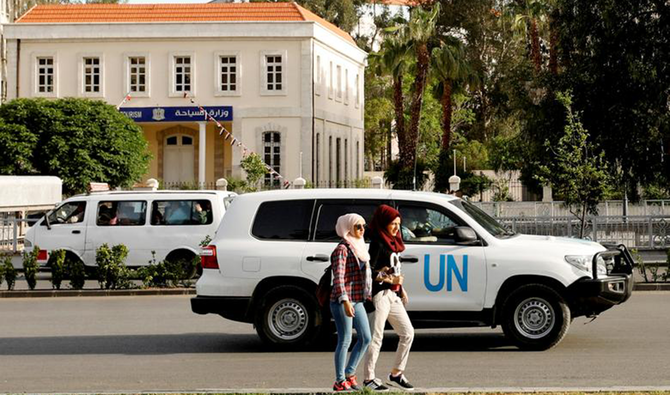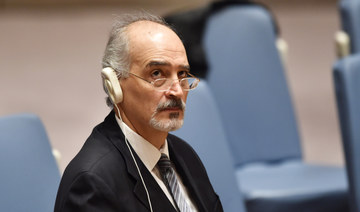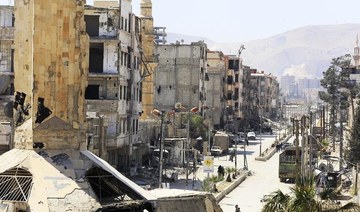NEW YORK: The victims of chemical-weapon attacks in Syria were barely mentioned during a UN Security Council meeting on Wednesday to discuss the Assad regime’s failure to comply with a resolution ordering the destruction of all such weapons.
As those victims were relegated to the sidelines, member states engaged in another, all-too familiar round of in-fighting as they traded accusations and vilified each other.
This was the 88th time the Security Council had gathered to discuss the issue of chemical weapons in Syria. Members were briefed by Izumi Nakamitsu, the UN’s under-secretary-general and high representative for disarmament affairs, on the implementation of Resolution 2118.
It was unanimously adopted in September 2013 following a UN investigation that confirmed the use of chemical weapons against civilians in a Damascus suburb the previous month. Images of people, including children, suffocating after breathing in the nerve agent caused outrage worldwide.
The resolution called on the Syrian regime to destroy its stockpiles of chemical weapons by mid-2014, and set out punitive measures in the event of non-compliance. It banned Syria from using, developing, producing, acquiring, stockpiling or retaining chemical weapons, or transferring them to other states or non-state actors.
In October 2013, Syria submitted to the Organization for the Prohibition of Chemical Weapons (OPCW) a formal initial declaration about its chemical-weapons program, including a plan for the destruction of its stockpiles.
Nakamitsu told the Security Council on Wednesday that, more than seven years later, the declaration “cannot be considered accurate and complete in accordance with the Chemical Weapons Convention (CWC).”
“Gaps, inconsistencies and discrepancies” have been identified that cast doubt on the true extent of the elimination of chemical weapons during the Civil War, she added.
While “some progress” has been made, resulting in the closure of three issues relating to the initial declaration, Nakamitsu said 19 issues remain outstanding as investigations continue into allegations of the use of chemical weapons in a “variety of incidents.”
One of those issues concerns a facility Syrian authorities said has never been used to produce chemical weapons. However information and evidence gathered by the OPCW since 2014 indicates that the production or weaponization of chemical warfare nerve agents did indeed take place there, Nakamitsu said. The organization ordered the Syrian government to disclose the types and quantities of chemical agents produced or weaponized at the site but it has yet to respond.
“I say this every month because it bears consistent repeating,” said Nakamitsu. “There is an urgent need to not only identify but hold accountable all those who have used chemical weapons in violation of international law. Without such an action, we are allowing the use of chemical weapons to take place with impunity.”
She also reminded council members of the need to heal geopolitical rifts and find common ground as a matter of priority.
“To address today’s roiling peace and security threats, we need to find a bridge back to common sense,” she said. “We need a united Security Council.”
Despite Nakamitsu’s plea, council members immediately displayed anything but unity.
Russia came to the defense of the Assad regime and attempted to discredit the OPCW report and its “unbelievable 19 issues.”
“This country is living (under a) Damocles’s sword of accusations of CWC noncompliance — this time in the form of outstanding issues of the initial declaration,” said Vassily Nebenzya, Russia’s permanent representative to the UN.
He warned member states that “squeezing Syria” could demotivate the regime in the country from cooperating with the OPCW, with whom he said it has acted as a “responsible partner … but the more concessions it makes, the more accusations it encounters.”
Nebenzya criticized the OPCW and what he called “the illegitimate nature” of its Investigation and Identification Team (IIT), then proceeded to highlight “other facts that our Western colleagues prefer keeping silent about.”
He accused Western delegations of blocking proposals by his country to investigate certain sites in Syria. Had these investigations taken place, he said, all of the council’s questions would have been answered.
The envoy also blamed “our Western colleagues” for never speaking up when the Syrian regime does something positive, and described their focus on the 19 outstanding issues relating to Syria’s initial declaration as “manifest slyness and a shift in emphasis.”
He accused the OPCW of bias and urged the Security Council to maintain its objectivity, saying: “We often hear urgent calls on Syria to ‘cooperate more.’ In response to that may we ask: what do you mean by ‘more?’ It seems that the only thing to meet these requirements would be Syria ‘acknowledging its guilt’ and publicly confessing to all deadly sins.”
He added: “What will be the point for Damascus to continue cooperating with the organization? After all, what is your goal: to ‘crush’ Syria as you did with Iraq on far-fetched pretexts, or ensure that Syrian soil is free of chemical weapons?”
Richard Mills, the acting US ambassador to the UN, said: “The Assad regime has repeatedly used chemical weapons against the Syrian people, and then subsequently sought to avoid accountability by obstructing independent investigations and undermining both the responsibility and work of the OPCW.”
He accused Russia of shielding the Assad regime by “spreading disinformation, attacking the professional work of the OPCW, and otherwise seeking to undermine efforts by responsible nations to hold the Assad regime accountable for its use of chemical weapons.”
The US and 45 co-sponsors have submitted a draft decision to the OPCW’s Conference of the States Parties in response to the Syrian regime’s failure to comply with measures requested by the OPCW Executive Council, demanding that the regime take action to address the situation.
“Unsurprisingly, Syria failed to complete any of the measures set forth in the decision,” said Mills, who called on the Conference of States Parties to take appropriate action when it reconvenes in the spring “so that we send a strong message to the Assad regime and its supporters that the use of chemical weapons in direct contravention of the Chemical Weapons Convention has consequences.”
Victims ignored amid UN bickering about chemical weapons in Syria
https://arab.news/46ryn
Victims ignored amid UN bickering about chemical weapons in Syria

- Disarmament chief calls for unity among Security Council members so those who use such weapons are held accountable
- Despite Izumi Nakamitsu’s plea for ‘a bridge back to common sense,’ members continue to point fingers and blame each other
Rafah incursion would put hundreds of thousands of lives at risk, UN aid agency says

- Leaders internationally have urged Israeli Prime Minister Benjamin Netanyahu to be cautious
- US Defense Secretary Lloyd Austin said any US response to such an incursion would be up to President Joe Biden
GAZA: The United Nations humanitarian aid agency says hundreds of thousands of people would be “at imminent risk of death” if Israel carries out a military assault in the southern Gaza city of Rafah.
The city has become critical for humanitarian aid and is highly concentrated with displaced Palestinians.
Leaders internationally have urged Israeli Prime Minister Benjamin Netanyahu to be cautious about any incursion into Rafah, where seven people — mostly children — were killed overnight in an Israeli airstrike.
On Thursday, US Defense Secretary Lloyd Austin said any US response to such an incursion would be up to President Joe Biden, but that currently, “conditions are not favorable to any kind of operation.”
Turkiye’s trade minister said Friday that its new trade ban on Israel was in response to “the deterioration and aggravation of the situation in Rafah.”
The Israel-Hamas war has driven around 80 percent of Gaza’s population of 2.3 million from their homes, caused vast destruction in several towns and cities, and pushed northern Gaza to the brink of famine.
The death toll in Gaza has soared to more than 34,500 people, according to local health officials, and the territory’s entire population has been driven into a humanitarian catastrophe.
The war began Oct. 7 when Hamas attacked southern Israel, abducting about 250 people and killing around 1,200, mostly civilians. Israel says militants still hold around 100 hostages and the remains of more than 30 others.
Dozens of people demonstrated Thursday night outside Israel’s military headquarters in Tel Aviv, demanding a deal to release the hostages. Meanwhile, Hamas said it would send a delegation to Cairo as soon as possible to keep working on ceasefire talks. A leaked truce proposal hints at compromises by both sides after months of talks languishing in a stalemate.
Across the US, tent encampments and demonstrations against the Israel-Hamas war have spread across university campuses.
More than 2,000 protesters have been arrested over the past two weeks as students rally against the war’s death toll and call for universities to separate themselves from any companies that are advancing Israel’s military efforts in Gaza.
Iraqi militant group claims missile attack on Tel Aviv targets, source says

- The attack was carried out with multiple Arqub-type cruise missiles
BAGHDAD: The Islamic Resistance in Iraq, a group of Iran-backed armed groups, launched multiple attacks on Israel using cruise missiles on Thursday, a source in the group said.
The source told Reuters the attack was carried out with multiple Arqub-type cruise missiles and targeted the Israeli city of Tel Aviv for the first time.
The Islamic Resistance in Iraq has claimed dozens of rockets and drone attacks on US forces in Iraq and Syria and on targets in Israel in the more than six months since the Israel-Hamas war erupted on Oct. 7.
Israel has not publicly commented on the attacks claimed by Iraqi armed groups.
15 pro-government Syrian fighters killed in Daesh attacks: monitor

- It is the latest attack of its kind by remnants of the jihadists
BEIRUT: Daesh group militants killed at least 15 Syrian pro-government fighters on Friday after they attacked three military positions in the Syrian desert, a war monitor said.
It is the latest attack of its kind by remnants of the jihadists.
They “attacked three military sites belonging to regime forces and fighters loyal to them... in the eastern Homs countryside, triggering armed clashes... and killing 15” pro-government fighters, the British-based Syrian Observatory for Human Rights said.
Daesh overran large swathes of Syria and Iraq in 2014, proclaiming a so-called caliphate and launching a reign of terror.
It was defeated territorially in Syria in 2019, but its remnants continue to carry out deadly attacks, particularly against pro-government forces and Kurdish-led fighters in the vast desert.
Daesh remnants are also active in neighboring Iraq.
Last month, Daesh fighters killed 28 Syrian soldiers and affiliated pro-government forces in two attacks on government-held areas of Syria, the Observatory said.
Many were members of the Quds Brigade, a group comprising Palestinian fighters that has received support from Damascus ally Moscow in recent years, according to the Observatory, which has a network of sources inside Syria.
In one of those attacks, the jihadists fired on a military bus in eastern Homs province, the Observatory said at the time.
Separately, six Syrian soldiers died in an Daesh attack against a base in eastern Syria, it added.
Syria’s war has claimed the lives of more than half a million people and displaced millions more since it erupted in March 2011 with Damascus’s brutal repression of anti-government protests.
It then pulled in foreign powers, militias and jihadists.
In late March, Daesh militants “executed” eight Syrian soldiers after an ambush, the monitor said at that time.
The jihadists also target people hunting desert truffles, a delicacy which can fetch high prices in the war-battered economy.
The Observatory in March said Daesh had killed at least 11 truffle hunters by detonating a bomb as their car passed in the desert of Raqqa province in northern Syria.
In separate unrest in the country, Syria’s defense ministry earlier on Friday said eight soldiers had been injured in Israeli air strikes near Damascus.
The Observatory said Israel had struck a government building in the Damascus countryside that has been used by Lebanon’s Iran-backed Hezbollah group since 2014.
The Israeli military has carried out hundreds of strikes in Syria since the outbreak of Syria’s civil war, mainly targeting army positions and Iran-backed fighters.
Prominent Gaza doctor killed by torture in Israeli detention

- Al-Bursh died in Ofer Prison, an Israeli-run incarceration facility in the West Bank, says the Palestinian Prisoners Society
GAZA: Adnan Al-Bursh, a Palestinian surgeon and former head of orthopedics at Gaza’s Al-Shifa medical complex, was killed on April 19 under torture in Israeli detention.
According to a statement from the Palestinian Prisoners Society, Al-Bursh, 50, died in Ofer Prison, an Israeli-run incarceration facility in the West Bank.
His body remains held by the Israeli authorities, according to the Palestinian Civil Affairs Committee.
The Palestinian Prisoners Society described the doctor’s death in Israeli custody as “assassination.”
Al-Bursh, who was a prominent surgeon in Gaza’s largest hospital Al-Shifa, was reportedly working at Al-Awada Hospital in the northern Gaza Strip when he was arrested by Israeli forces.
The Israeli prison service declared Al-Bursh dead on April 19, claiming the doctor was detained for “national security reasons.”
However, the prison’s statement did not provide details on the cause of death. A prison service spokesperson said the incident was being investigated.
Francesca Albanese, the UN special rapporteur on the occupied Palestinian territories, said on Thursday she was “extremely alarmed” at the death of the Palestinian surgeon.
“I urge the diplomatic community to intervene with concrete measures to protect Palestinians. No Palestinian is safe under Israel’s occupation today,” she wrote on X.
I am extremely alarmed by information that Dr. Adnan Albursh, a well-known surgeon at #alshifa_hospital, has died while detained by Israeli forces in the Ofer military prison. While I acquire more information, I URGE the diplomatic community to intervene with CONCRETE MEASURES to…
— Francesca Albanese, UN Special Rapporteur oPt (@FranceskAlbs) May 2, 2024
Since Oct. 7, when Israel launched its retaliatory bombing campaign in the Gaza Strip, the Israeli military has carried out over 435 attacks on healthcare facilities in the besieged Palestinian enclave, killing at least 484 medical staff, according to UN figures.
However, the health authority in Gaza said in a statement that Al-Bursh’s death has raised the number of healthcare workers killed in the ongoing onslaught on the strip to 496.
Palestinian prisoner organizations report that the Israeli army has detained more than 8,000 Palestinians from the West Bank alone since Oct. 7. Of those, 280 are women and at least 540 are children.
ICC prosecutor calls for end to intimidation of staff, statement says

- The ICC prosecutor’s office said all attempts to impede, intimidate or improperly influence its officials must cease immediately
- The statement followed Israeli and American criticism of the ICC’s investigation into alleged war crimes committed during the Israel-Hamas conflict in Gaza
AMSTERDAM: The International Criminal Court’s prosecutor’s office called on Friday for an end to what it called intimidation of its staff, saying such threats could constitute an offense against the world’s permanent war crimes court.
In the statement posted on social media platform X, the ICC prosecutor’s office said all attempts to impede, intimidate or improperly influence its officials must cease immediately. It added that the Rome Statute, which outlines the ICC’s structure and areas of jurisdiction, prohibits these actions.
The statement, which named no specific cases, followed Israeli and American criticism of the ICC’s investigation into alleged war crimes committed during the Israel-Hamas conflict in the Gaza Strip, a Palestinian enclave.
Neither Israel nor its main ally the US are members of the court, and do not recognize its jurisdiction over the Palestinian territories. The court can prosecute individuals for alleged war crimes, crimes against humanity and genocide.
Last week Israel voiced concern that the ICC could be preparing to issue arrest warrants for government officials on charges related to the conduct of its war against Hamas in Gaza.
Foreign Minister Israel Katz said Israel expected the ICC to “refrain from issuing arrest warrants against senior Israeli political and security officials,” adding: “We will not bow our heads or be deterred and will continue to fight.”
On Friday, Israeli Prime Minister Benjamin Netanyahu said any ICC decisions would not affect Israel’s actions but would set a dangerous precedent.
In October, ICC Chief Prosecutor Karim Khan said it had jurisdiction over any potential war crimes committed by Hamas fighters in Israel and by Israeli forces in Gaza, which has been ruled by Hamas since 2007.
A White House spokesperson said on Monday the ICC had no jurisdiction “in this situation, and we do not support its investigation.”






















